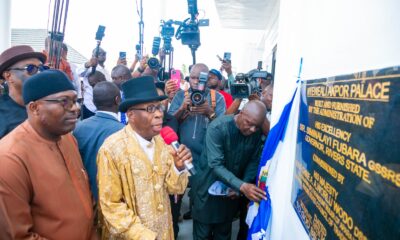Business
No Thanks For Junk Buses
Vehicles belonging to the Port Harcourt City Bus Service (PHCBS) now ply the major roads of our state capital in their numbers. The service, as we are told, is a joint venture between the Rivers State Government, Skye Bank Plc and the National Union of Road Transport Workers (NURTW).
Launched in January 2009, the mass transit bus service came as a filler to the gap created by the ban on the operation of commercial motorcycles popularly known as Okada, especially in Port Harcourt, Obio/Akpor, Eleme and Oyigbo Local Government Areas.
Much as one will readily commend the scheme as having served in no mean measure to check the anger, exploitation and total frustration that would have attended the Okada ban, it will surely not be out of place to state that the age and make of some of the buses now being deployed under the scheme leaves much to be desired.
Let’s get this straight. Right from inception, Rivers State has always marked itself out as an entity that believes in the provision of quality services for its people. Alfred Diete-Spiff, pioneer military governor of the state and current Amanyanabo of Twon Brass in neighbouring Bayelsa State, always gets a standing ovation whenever his majestic presence is announced at any public gathering in both states. Obviously, this is a people’s way of appreciating a worthy public servant.
The then Navy Commander Diete-Spiff had, while grappling with the task of reconstructing and rehabilitating a newly created but war-torn Rivers state in the early 1970s, insisted on the use of best designs and quality materials in the provision of public amenities for the people. The Secretariat Complex in Port Harcourt, along with its skyscraping Point Block, is one of the many enduring landmarks of that era.
Equally worthy of mention and even more relevant to this discourse is the state-sponsored public transportation system which was introduced by Diete-Spiff. Waterline, as the scheme was then called, had in its fleet some of the sturdiest and most reliable brands of luxury buses and ferry boats of the time. Although succeeding administrations, both military and civilian, tried to add to the fleet inherited from this pioneer regime, their commitments to quality and proper maintenance were largely suspect. And so, only those early post-war acquisitions, particularly the marine vessels, endured until the splitting of old Rivers State in 1996.
Back to the moment. The new bus service scheme now operating in the state started with the deployment of few fairly-used and refurbished Marcopolo (Mercedes Benz) and Ashok Leyland buses adorned with the yellow and blue colours of Skye Bank.
There was an addition of a few Tata buses, later. Most of these vehicles, at their initial outings, still had all their interior and exterior lights and fittings, including in-built radio systems.
Commuters were indeed happy with the state government for such timely intervention. They were equally gladdened by the fact that these buses came in fairly sturdy shapes, with promises of endurance and longevity.
Talking of endurance, the individual strengths of these vehicles can hardly be tested by the excessive loads they convey per trip nor the number of non-stop rounds they make per day, but by the numerous gauntlets they have had to run in the hands of Area Boys (Agberos) at nearly every bus stop along their assigned routes. In fact, only little else can account for the heavily battered panels, missing bumpers and vandalised exterior lamps of most of these buses a few months after their deployment.
It is for this reason that one expects operators of the scheme, particularly Skye Bank, to always go for such vehicles as were already being used. Surely, their latest additions to the PHCBS fleet are glorified scraps, to say the very least. Those vehicles could have been imported from the most impoverished European or Asian country. Their make or model is not readily identifiable. Neither has one, at any time, seen their rear doors open for passengers to enter or exit. In fact, about three of these vans were said to have broken down at various spots along Aba Road on their very first day of operation. Too bad!
Any further importation and use of such apparently scrapped vehicles can only add to the already high cost of operation. And recouping such expenses through whatever marginal increase in fare will most certainly be an uphill, if not futile, exercise.
Ibelema Jumbo
Business
Abolish Multiple Taxation In Rivers, Group Urges Govt
Business
MDAs, Presidency Spend N1.9bn On Trips, Trainings In France
Business
NCDMB, ARPHL, Others Partner On Refinery Project
-

 News2 days ago
News2 days agoFubara Urges Rivers People To Remain Peaceful, Law-abiding …As Eze Worlu-Wodo Inaugurates Palace For Akpor Kingdom
-
Business2 days ago
IWD: DBN Disburses N272b To Women Businesses
-

 Niger Delta2 days ago
Niger Delta2 days agoNACA Debunks Fake HIV Drug Pricing News
-
Business2 days ago
MDAs, Presidency Spend N1.9bn On Trips, Trainings In France
-
Politics2 days ago
You’re Democratic Accountability Agents, Diri Tells Journalists
-

 Featured2 days ago
Featured2 days agoWe’ll Comply With Supreme Court Judgement, Fubara Assures …As CJ Inaugurates Judges’ Quarters
-
Business2 days ago
Coy Launches $2m Fund For Nigerian Entrepreneurs
-
Sports2 days ago
RFF Announces 15 Players For African Games

